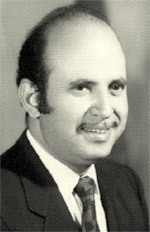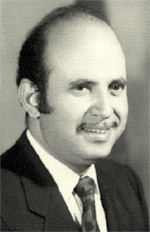
Yemens Ambassador to Tunisia Al-Arashi to YT We have reached an agreement with the Tunisian educational and vocational training authorities over bringing more Yemenis to study in Tunisia.. [Archives:2001/51/Interview]
December 17 2001

More than 100 Yemen students currently study in this beautiful and developed country. Most of these students have been sent to Tunisia through a Hadhrami society in Saudi Arabia.
The Yemeni-Tunisian relations are more than warm and exemplary. Such strong relations should be a motive for Yemen to benefit from the Tunisian experience in development and progress. To see how much this is happening and to what extent relations between the two countries are strong, the YTs Correspondent in Tunisia, Abdulbaqi Shamsan, met with the Yemeni Ambassador, Mr. Yahya Al-Alarashi, and filed the following interview.
Q: Could you brief us on the Yemeni community in Tunisia and the nature of its existence?
A: As a matter of fact, there is not a real community in the correct sense of the word. There are no Yemeni expatriates or immigrants here. There is what we call the historical community. About 35-40 percent of the population of Tunisia are descended from Yemeni origins. This can be attributed to the ancient Yemeni immigration, particularly to the south of Tunisia. This is a very important dimension with regard to the Yemeni-Tunisian relations. Yemeni immigrants arrived here in big numbers, especially during the Islamic Conquest. They also helped spread Islam here. They came from different places like Egypt and settled in the south of Tunisia. It is interesting to know that Susa, one of the cities here, sued to be called Hadhramout.
About the Yemeni community at the present time, there are about 100 Yemeni students here. The 100 Yemeni students studying in Tunisia are true representatives of the Yemeni culture and values in Tunisia.
Q: Could you elaborate the situation of the Yemeni students here and their kinds of study?
A: We have done our best to provide Yemeni students with academic studies in Tunisia, in addition to other opportunities of training and rehabilitating. We have reached an agreement with the Tunisian educational and vocational training authorities over bringing more Yemeni Students to study in Tunisia.
Some students are preparing for their masters and doctorate degrees. There are also trainees in the field of oil and vocational training.
Q: Are there other future spheres of cooperation between the two countries?
A: Actually, the future vision is given a priority. The joint ministerial committee, chaired by the two ministers of foreign affairs meet annually in Tunisia and Yemen to discuss means and fields of cooperation between the two countries. So far, about 60 agreements of cooperation have been signed. These include different kinds of cooperation fields. For example, last month there was an agreement between the two ministries of transportation to cooperate in this field. To benefit from the Tunisian experience in this field, more than ten experts are leaving for Yemen to make comprehensive studies on the needs of Yemen in this domain.
Q: What about investment?
A: Great efforts have been made to encourage and motivate businessmen and investors to make use of facilities granted by the two countries. An ad hoc Businessmen Council has been set up to study all opportunities of investments in both countries.
Presently some kinds of fish, leather, marble are imported from Yemen. At the same time, Tunisian products, especially clothes, are marketed in Yemen. These products come to Yemen through the Gulf countries. We have been trying to make direct trade exchange between the two countries.
Q: Do you have any plans or policies with regard to marketing the Yemeni products in Tunisia?
A: We have urged upon the bodies concerned to push the private sector to organize commercial exhibitions in the two countries. We have great hopes that such activities will come to being in the near future.
Q: President Saleh has visited Tunisia and a number of agreements were signed. Are you expecting a visit by President Zain Alabedeen of Tunisia to Yemen to further enhance the bilateral relations of the two countries?
A: President Salehs visit to Tunisia has been very fruitful. A good number of official visits have been triggered off between the two countries following this visit. A number of important agreements, particularly in the field of security, investment and development, have been recently signed during the meeting of the joint ministerial committee in Sanaa.
Q: Yemens Unity has gone through ups and downs before it was achieved. What are your memories of the long-drawn struggle to achieve it?
A: Yemens Unity was faced by many challenges and problems. It was like giving birth to a new child; full of pain and suffering.
The talk about Unity needs volumes and this subject can not be given its due coverage in this short time.
Iwas always disturbed by people opposing to unity of the two sides of Yemen. I remember that before unity there were talks between the two sides to have a joint oil investment project in the Wadi Jennah. There were many attempts to blow up the intended projects. And there was heavy firing at the time of signing the agreement. But the two leadership were more determined to cooperate with each other. Many positive steps followed. I was very delighted when the barrels erected in the Shurijah area as a sign of separation were removed.
Q: Do you think that the Summer War of 1994 was a result of internal and external elements that perceived Unity as a threat to their interests?
A: Undoubtedly, Unity of Yemen surprised all who though it was a dream that would never come true.
Some people whose interests were affected by Unity were waiting for a chance to destroy what had been achieved. Their thoughts met with similar ones from outside the country an all had great influence.
Any way, Yemens unity was not an easy task that could happen without heavy losses. However, we feel proud that the it was peacefully achieved in 1990.
Q: Some people say unity was based on a political decision rather than the publics well. What are your comments?
A: Of course, the decision was not politically issued. Fortunately, the condition of the two sides of Yemen at the time had many aspects in common. A kind of closeness was there. These helped facilitate the establishment of unity.
Q: The past conflicts in both sides of Yemen have weakened our economy. How do you think Yemen at its present stage can benefit from such experiences?
A: Segregation circumstances were the main impediment to the development. We had to be united to be able to develop. What we need is a sense of responsibility. The constitution should be respected and implemented and those on charge of the decisions making should be a match to the expectations of the country in order to develop and build our country.
Countries, including Yemen, should always learn from their mistakes.
Q: Is there a call for a national reconciliation among Yemeni political powers?
A: There is no need to this term. Pluralism is there and it is governed by a constitution and a set of laws. But these need to be activated. The parliament should be a real monitoring and supervising body. The press should play the same role.
We should not run after our selfish interests. Fraudulent practices against law or constitution shouldnt be our main interest. The national reconciliation lies within the man himself; how he can so something good for his party or organization.
Q: What about reconciliation with the so-called secessionists who live abroad?
A: I think the General Amnesty is a a good opportunity for all national powers to unite. Those who want to contribute to the development and progress of the country should return home.
——
[archive-e:51-v:2001-y:2001-d:2001-12-17-p:./2001/iss51/intrview.htm]


